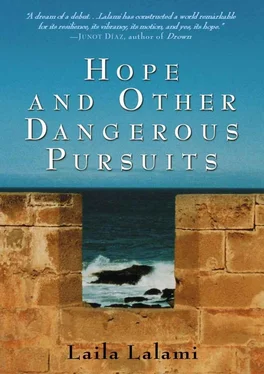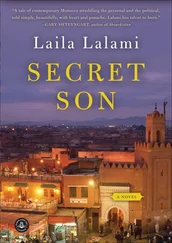Hanan shuffled through her papers while Halima went about her work. When she finished cleaning up the receiving room, she put the mops in the kitchen cabinet and washed her hands. “I’m done,” she announced, and put her jellaba on to leave. Hanan didn’t hear, busy as she was staring at her papers.
“Lots of work?” Halima asked.
“Me? Oh, yes,” Hanan said. “As long as people want to emigrate, there’ll be plenty for me to do.”
Without realizing it, Halima slid into the chair opposite Hanan. She thought about her brothers, Tarik leaving one morning when she was still a young girl and Abdelkrim following him only months later, and how there had been no word from either of them for a year. Then the money had started coming, sporadically at first, and later with addicting regularity, and while her mother managed on the payments, Halima, who didn’t benefit from their largesse with the same consistency, still lived in the same cement house with the corrugated tin roof and brown water streaming down the middle of the street. She wondered now what would have happened had she, too, gone to Europe like her brothers. Would she have an apartment, a washing machine, maybe even a car? Would she have Maati?
She sat still, and Hanan looked up, a question in her eyes. Halima folded her hands and looked at her shoes. “I was thinking …” She wet her lips with her tongue. “How difficult would it be to emigrate?”
Hanan’s shoulders dropped. She grabbed a pencil and began tapping it nervously between her fingers. “I’m not a lawyer. I translate documents.”
Halima shrugged. “Still,” she said. “You’d know.”
“Have you seen the lines at the embassies?” Hanan asked.
Halima nodded, even though she hadn’t seen them. Maati had told her about them, though, about people queuing up for an entire night just to get a spot inside the buildings, never mind an actual application. He liked taking customers to the embassies because cab fares were higher in the evening, when the lines formed. “But I have my brothers in France,” she said.
“Ah,” Hanan said. She looked away, as though she was too embarrassed to say anything, and then drew her breath. “Still, they don’t give visas to …”
Halima knew what Hanan meant, knew that people like her, with no skills and three children, didn’t get visas.
“Take the bastard to court,” Hanan said with a sigh.
“I already have.”
Hanan blinked, sat back in her chair, at a loss for what to say. The room was quiet, the only sound that of the pencil, still tapping between Hanan’s fingers.
“But isn’t there some way to get a visa?” Halima asked.
Hanan shrugged. “You have to have a full-time job, a bank account, a ticket, a place to stay — it’s complicated,” she said, as though Halima couldn’t understand anything that required more than three easy steps, like wash, lather, and rinse. I know so much more than that, Halima wanted to tell her. She suddenly felt sorry for having said anything at all to Hanan. It was a mistake to have thought that Hanan or that judge or that magic powder could get her out of her situation.
“There must be some other way,” Halima said.
“You mean, go illegally?”
Halima shrugged. She knew what she would say the next time her mother rehashed that old song about being patient: She had to do something for her future — today.
AZIZ AMMOR HAD SPENT the week saying goodbye. So far, he’d visited two sets of aunts and uncles, four friends, and several neighbors, but none of them offered him good wishes for his trip. When they’d found out about his plan to try his luck on a patera, they’d tried to disguise their shocked looks, tapped his back to offer encouragement, and shaken their heads in commiseration. He was getting tired of the silence that his announcement provoked, so he was relieved when, upon hearing the news, his friend Lahcen knocked the table over as he stood up.
“Have you lost your mind, Ammor?” he said. Even though Lahcen and Aziz had known each other since elementary school, Lahcen still called Aziz by his last name, the way schoolboys often did. Aziz and Lahcen had been friends for nearly twenty years now. Together they had snuck into movie theaters, shared their first cigarette, split their first bottle of beer — a Heineken left behind on the beach by a group of preppy teenagers celebrating a graduation. They had also picked up girls together, although it was usually Aziz who did the picking up. Lahcen, Aziz had noticed, never seemed to have much luck with women.
Aziz set the table back on its legs, stealing a glance at his wife, Zohra, who sat on the divan opposite him. She had tried many times to dissuade Aziz, and she watched the scene with the detachment of someone who’d already heard all the arguments, yet who was still curious to see whether they would be resolved any differently this time. Aziz and Zohra had dropped in on Lahcen shortly after the ‘asr prayer on Sunday. Lahcen lived with his parents and four sisters in a two-story house in Derb Talian, in the old medina of Casablanca. The window was closed, but the occasional sound of car horns and bicycle bells could still be heard through the glass panes.
“Calm down,” Aziz said.
Lahcen opened up his palms and raised his voice. “How can you tell me to calm down? You could drown!” He was like that — he always thought of the worst right away.
“I’m a good swimmer,” Aziz said. “And anyway, these days they have motor boats. They’ll drop me off on the beach.”
“And you think Spain’s going to be great? It’s all just hard work and ghurba and loneliness.”
“At least he’ll make a living,” Zohra said. Aziz was surprised to hear her jump in with the very words he’d used to persuade her a few weeks earlier. Her family had never liked him — they had let Zohra marry him only because she had been going out with him for three years and the gossip from the neighbors about their “loose daughter” had finished them off. But the marriage didn’t help Aziz’s tense relations with his in-laws. They had been nagging Zohra about his joblessness, and their comments had grown more persistent after she’d managed to find a job at a soda factory.
When the idea came to him, Zohra had tried to dissuade him, but she gave in after another few months of his unemployment. She said she’d wait for him and when he came back they could move out of his parents’ house, have a place of their own, and start a family. In short, she said, they could start living.
“And what about you?” Lahcen said, pointing at Zohra. “He’s going to leave you behind?”
“I’ll be back in two or three years,” Aziz said.
“Haven’t we all heard this before?” said Lahcen, his finger on his cheek in a gesture that made him look like a woman. “No one comes back.”
“ I am coming back,” Aziz said, his thumb on his chest.
“He will,” Zohra said. She took her handkerchief from the sleeve of her jellaba and blew her nose in it. Aziz felt his guilt at leaving her behind pick at him again, and he put his hand on her knee and squeezed it gently.
“Why are you so against this?” Aziz asked Lahcen. “What do you want me to do?”
Lahcen’s sister Hakima came into the room, carrying a tray of tea and cookies. Lahcen reached for his pack of cigarettes and walked out. Aziz looked back and forth at the two women, his wife and his best friend’s sister, and feeling a little awkward about being left alone with them, got up and followed Lahcen outside.
“So, what do you want me to do?” Aziz asked, as he sat down next to his friend on the steps. He was genuinely curious what the answer would be.
Читать дальше












